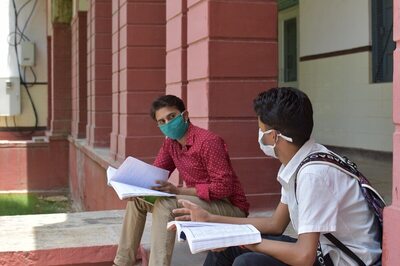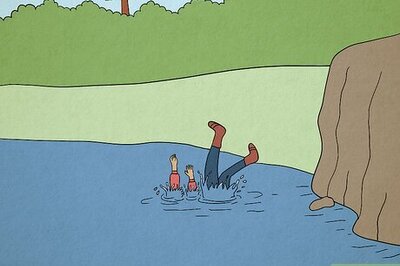
views
After giving birth to five girls, Sheela Devi of Muzaffarpur in Bihar was blessed with a son five years ago. In a society that is still in the clutches of patriarchy, being finally “blessed with a son” was reason enough for Sheela to be happy despite all her struggles. Sheela and her husband, both working as labourers, work hard to make their ends meet.
“We are poor and struggle for a lot of things. But looking at my son Prince Raj, I would forget all my hardships. I was happy. But it seems God could not see my happiness,” says Sheela, who lost her only son to Acute Encephalitis Syndrome (AES) which, till now, has claimed 163 lives in Bihar.
Sheela is traumatised and remains confined to her house as she says “all hopes of life have shattered completely”.
On June 12, Sheela had gone to attend a marriage ceremony to a nearby village along with her five daughters and son Prince. While returning to her village Dariyapur she bought samosas for her six children. All of them ate the snack. Sheela recalls that her children had dinner together at 7.30 in the evening and she made her four-year-old son sleep in her lap.
At 6.30am the next day, she saw Prince’s body turning stiff with signs of convulsions. She and her husband rushed the boy to Kejriwal hospital In Muzaffarpur but could not save him.
Prince had suffered first convulsions at around 6.30 am. He was taken to hospital within an hour and immediately attended to by the doctors. He was administered dextrose. He was given all possible medicines and treatment.
The tragic deaths of 129 children in Muzaffarpur is not a story of statistics or health emergency alone. It is a story of shattered hopes and lives of victims’ families.
“My son was a healthy boy and he never showed any signs of the disease earlier,” says Sheela, who was aware of the ongoing deaths in the region as she was told by auxiliary nurse midwife (ANM) not to let her kids go near the litchi orchard. So she claims to have taken all precautionary measures like giving oral rehydration solution (ORS) to her children to save them from any sort of illness.
Her misery worsened when she realised that the cheque of Rs 4 lakh, which she got as “compensation” for her child’s death, was not in the name of her husband. “My husband name is Nunno Mahto and the cheque that block development officer (BDO) gave to me was in name of Tullo Mahto, so I returned it”, says Sheela when asked about any help she received from the government.
Rekha Devi is another victim of AES in Bihar. A resident of Dariapur village, Rekha met the same fate as Sheela on June 13 when her seven-year-old daughter, Nidhi, succumbed to AES. Nidhi was the eldest of her five siblings and died in Shree Krishna Medical College Hospital (SKMCH).
Rekha’s house is surrounded by litchi and mango orchards. As she was aware of children’s death in the region she, too, took necessary precautions to ensure the safety of her children.
“We tried our best as we were aware of the deaths taking place in the region but could I not save my daughter,” said Subodh Paswan, Rekha’s husband.
Nidhi, who died on June 13, took her first meal after waking up at 9 in the morning. She had a headache so she wanted to sleep more. “She never had any problems earlier. But on that day she suddenly started showing signs of convulsion while taking her meal in the morning around 9am,”says Rekha.
According to Nidhi’s father, she was first taken to a primary health centre in Kanti block. She reached there by 10.30 am and was administered two bottles of saline water and referred to Shree Krishna Medical College (SKMCH).
“I took Nidhi to SKMCH by 11.30am where she was immediately given some medicine. She survived for around four hours and was declared dead around 3.15 pm,” said Nidhi’s father Subodh Paswan.
Sunil Kumar Shahi, medical superintendent, SKMCH, explained: “Her sugar level was below 30 so she succumbed as sugar level below 50 is considered fatal.”
“It is always advisable in such cases to take the patients immediately to the hospital. But sometimes parents don’t understand the gravity of the situation and delay in bringing their children to hospitals on time and this proves fatal,” Shahi added.
Arun Kumar Shah, pediatrician, said, “It is advisable to bring the child within four hours after first signs of the problem as it takes time to determine if the child is hypoglycemia or has some other problems.”
Dariyapur is in the Kanti block in Muzaffarpur and the block development officer (BDO) there had initiated awareness program in March and April as five years ago a boy in the block had met the same fate. In another village Damodri, five-year-old Savista Praveen lost her life on June 15 due to the same problem. She died in SKMCH in Muzaffarpur after being treated for three days.
“Two cases have been reported in our village this year. One child is fighting for survival in hospital whereas another died a few days back,” said Mohammad Abbas Ahmad, a Madarsa teacher in Damodri.
Villagers in the Damodri never faced this problem in the past so they are shocked due to the rising incidents. Damodri, a Muslim-dominated village, has started an awareness campaign to prevent children from leaving their homes in the day time.
“We are facing the worst weather this summer and two of our kids have already fallen prey to it. Whatever best is possible we are doing to save our kids, “said Nishar Ahmad, a school teacher.
The village gets electricity for a maximum for 12 hours and that too is of little use as only one phase of electricity is available. And in this condition, even fans don’t work properly. Doctors suggest keeping children in cool atmosphere, but this also becomes difficult due to lack of proper electricity.
These two villages are not the only ones grappling with the problem. In village Rampur Saal in Marvan block in Muzaffarpur, too, two kids from the same family have died in two days.
Laxman Manjhi lost his two grandsons Rajkumar and Prince, aged 19 months and 24 months, respectively.
Struck by this tragedy on June 10 and June 11, Laxman has stopped going to work. Both the grandsons died while being taken to the hospital. There is complete despair in the family.
Laxman has also not received the compensation of Rs 4 lakh announced by the government. “No government official has visited my place till now and I have not been offered any help,” says Chinta Manjhi, Laxman’s daughter-in-law.



















Comments
0 comment